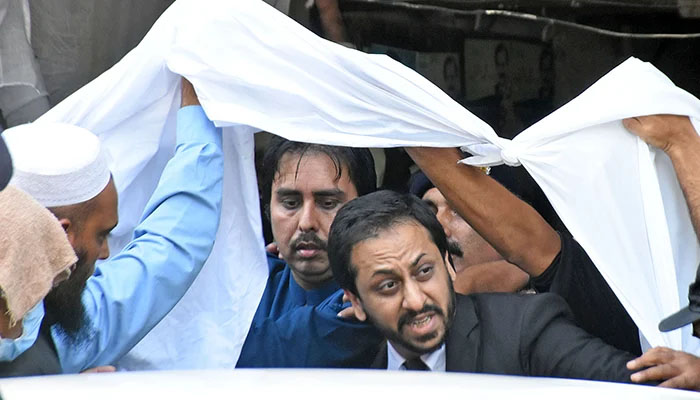Alleged torture of Gill: IHC directs interior ministry to conduct inquiry
The IHC disposes of the plea against the extension in Gill’s physical remand to the police
ISLAMABAD: The Islamabad High Court (IHC) ruled on Wednesday that the allegations of torture on senior PTI leader Shahbaz Gill could not be ignored.
The IHC observed this in the verdict issued on Shahbaz Gill’s plea against an extension in his physical remand. “The Constitution and the courts are the guardians of prisoners’ rights and protectors against torture,” the IHC stated in a 21-page verdict.
The verdict also states, “Torture of an accused person cannot be allowed under the guise of gathering evidence.” The verdict, authored by IHC acting Chief Justice Aamir Farooq, directed the Ministry of Interior to conduct an inquiry into the allegations and to appoint a retired high court judge as an inquiry officer.
The IHC disposed of the plea against the extension in Gill’s physical remand to the police, directing that an officer of the rank of senior superintendent of police should supervise and ensure that no violence was inflicted on Gill during physical remand.
The verdict stated that the IG Police denied the allegations of any torture inflicted on Gill but when he arrived at Adiala Jail on August 12, the medical officer noted in the register that he had several wounds and marks on his body.
As per the Rule 20 of the Prison Code Rules, a prisoner with injuries on his body should be examined immediately by the medical officer when he is admitted to prison from police custody.
“If the examination reveals unexplained injuries not already recorded in the medico-legal report accompanying the prisoner, a report shall at once be made to the Sessions Judge and officer in-charge of the prosecution and superintendent police,” the rules state.
The judgment said that no action was taken in this regard as neither the sessions judge nor superintendent of police nor office of advocate general, were informed about Gill’s condition. Later, when a medical board was formed for the medical examination of Gill, on August 13 and 15, the prosecution said that Gill refused to have himself examined.
Moreover, a report on the medical examination performed on August 17 clearly stated that Gill needs monitoring and assessment but nothing about physical torture. Meanwhile, Shahbaz Gill told a journalist that he was given electric shocks. Earlier, the PTI leader had also claimed that he had been sexually abused in jail.
Meanwhile, the IHC adjourned hearing into a petition seeking disposal of case as dismissed on sedition charges against Shahbaz Gill. IHC acting Chief Justice Aamer Farooq heard the case filed by Shahbaz Gill, requesting the court to quash the FIR lodged by the Kohsar Police Station. Prosecutor Rizwan Abbasi requested the court to grant sometime for submission of related documents.
Meanwhile, a lower court of Islamabad rejected the request of prosecution for further physical remand of Pakistan Tehreek-e-Insaf leader Shahbaz Gill and sent him to jail on judicial remand.
The Islamabad Police produced accused Shahbaz Gill before the court of Judicial Magistrate Malik Aman after expiry of his physical remand, and requested for his (Gill’s) seven-day physical custody to complete the investigation process. Special Prosecutor Rizwan Abbasi informed the court that the police had not wasted even a single moment and investigated the accused on daily basis. The police needed further custody of the accused as they had to conduct his polygraph test from Lahore. He said the police had examined Gill’s phones and four USBs, besides carrying out search of his room during the last two-day physical remand. The prosecution, however, still required answers of a few questions from the accused and also his main mobile phone was yet to be recovered.
The judge asked whether the prosecution had not requested for the polygraph test of the accused in the last remand. The prosecutor answered in the negative saying they had rather requested it in the remand which was suspended. To a court’s query, Rizwan Abbasi said that they would get the polygraph test done from Islamabad if it was possible here. The investigation is still incomplete as some recoveries and details about the other accused are pending. He said in the weapon case, the police themselves had requested the court to send the accused to jail. The progress in the investigation process during the two-day remand was available.
The judge remarked that the court of Additional Sessions Judge Zeba Chaudhry had also granted a two-day physical remand of the accused, besides the 48 hours remand given by his court. Whether there was a way left for him to grant more remand, he asked.
Rizwan Abbasi read out the verdict of Judge Zeba Chaudhry and said that the court had not said that it was giving the last opportunity to the police to complete the investigation. He prayed to the court to grant further seven-day custody of the accused to the police.
Shahbaz Gill’s counsel Faisal Chaudhry contended that the police had raided his room in the Parliament Lodges. The prosecution every time talked about the recovery of a mobile phone whenever it requested for the remand, while the police had recovered four mobile phones. He said the prosecution did not know whether the polygraph test was available in Islamabad or not. He alleged that the police had done nothing except torturing his client in the last 16 days, while opposing the request of further physical remand. He prayed to the court to send his client to jail on judicial custody.
Gill’s lawyer Ali Bukhari claimed that his client had no criminal history. After listening to arguments from both sides, the court rejected the prosecution’s request for further seven-day remand of Gill and sent him to jail on judicial remand.
Meanwhile, the Human Rights Watch (HRW) demanded an immediate, independent, and transparent investigation into the alleged torture of PTI leader Shahbaz Gill in police custody. The demand comes after Gill’s lawyers and PTI colleagues repeatedly alleged that security officials beat and otherwise tortured Gill in custody. They also assert that he was denied medical treatment for his asthma condition; however, the federal government and police have denied the allegations.
Gill was arrested on August 9 in Islamabad after a sedition case was filed against him at a police station in the federal capital for inciting mutiny in the Pakistan Army. In a bid to end the ordeal, John Sifton, Asia advocacy director at Human Rights Watch, urged the Senate to urgently pass a bill that would make torture a criminal offence. On August 1, 2022, the National Assembly passed the Torture and Custodial Death (Prevention and Punishment) Act, which, if enacted into law, will for the first time criminalise torture by Pakistan’s security forces.
The bill has been sent to the standing committee and can be considered as early as in the next Senate session later in August, the HRW official said. “The first step to ending Pakistan’s endemic torture problem is to criminalize it,” said Sifton.
“Justice and accountability in cases of torture will only be possible if parliament passes the torture bill and the government enforces the law by carrying out transparent and impartial investigations into torture allegations.”
It said that the HRW has long documented the widespread use of torture and other ill-treatment by the police during criminal investigations. Criminal suspects from marginalised groups are at particular risk of police abuse, the watchdog said, adding methods of torture include beatings with batons and littars (leather straps), stretching and crushing legs with roola (metal rods), sexual violence, prolonged sleep deprivation, and causing severe mental anguish, including by forcing detainees to watch other people being tortured.
Allegations of torture in political cases need to be investigated by authorities independently of the political interests of the governing authorities, Human Rights Watch said. During previous governments, there have been numerous credible allegations of torture and ill-treatment of political opponents or critics of the government. The use of torture in political cases has received recent attention, the HRW said. “By passing the torture bill, Pakistan will start a long-overdue process of reform to ensure that future allegations of torture are transparently investigated and that those responsible held accountable,” Sifton said.
-
 NASA Celebrates One Year Of Trump’s Second Term With Moon And Mars Achievements
NASA Celebrates One Year Of Trump’s Second Term With Moon And Mars Achievements -
 Chris Pratt Shares Real Thoughts On AI In Film Industry
Chris Pratt Shares Real Thoughts On AI In Film Industry -
 Netflix Disappointed As Meghan Markle’s Series Struggles To Impress
Netflix Disappointed As Meghan Markle’s Series Struggles To Impress -
 Royal Family Announces Death Of Princess: King Releases Statement
Royal Family Announces Death Of Princess: King Releases Statement -
 Sarah Ferguson Will Continue To Be Part Of Andrew's Life
Sarah Ferguson Will Continue To Be Part Of Andrew's Life -
 Google’s Gemini Now Offers Free SAT Prep With Full-length Mock Tests
Google’s Gemini Now Offers Free SAT Prep With Full-length Mock Tests -
 Everything You Need To Know About Macron’s Viral Glasses: Cost, Model, All Details Revealed
Everything You Need To Know About Macron’s Viral Glasses: Cost, Model, All Details Revealed -
 Elon Musk Warns Of AI ‘supersonic Tsunami’: What It Means For Future
Elon Musk Warns Of AI ‘supersonic Tsunami’: What It Means For Future -
 Why Victoria Beckham's Dance Video From Brooklyn's Wedding Won't Be Released
Why Victoria Beckham's Dance Video From Brooklyn's Wedding Won't Be Released -
 Prince Harry No Longer Focused On Healing Royal Family Feud?
Prince Harry No Longer Focused On Healing Royal Family Feud? -
 OpenAI Aims To Make AI A Daily Global Tool
OpenAI Aims To Make AI A Daily Global Tool -
 Will Andrew Receive Any Royal Treatment After Title, Royal Lodge Removal?
Will Andrew Receive Any Royal Treatment After Title, Royal Lodge Removal? -
 How Your Body 'suffers' In Back Pain And Simple Way To Fix It
How Your Body 'suffers' In Back Pain And Simple Way To Fix It -
 What Victoria Beckham Really Did At Brooklyn, Nicola’s Wedding Revealed
What Victoria Beckham Really Did At Brooklyn, Nicola’s Wedding Revealed -
 Send Your Name To Moon With Nasa’s Artemis Mission: Here’s How
Send Your Name To Moon With Nasa’s Artemis Mission: Here’s How -
 Zhipu AI, MiniMax Debuts Mask Structural Hurdles For China’s Tech Giants
Zhipu AI, MiniMax Debuts Mask Structural Hurdles For China’s Tech Giants




